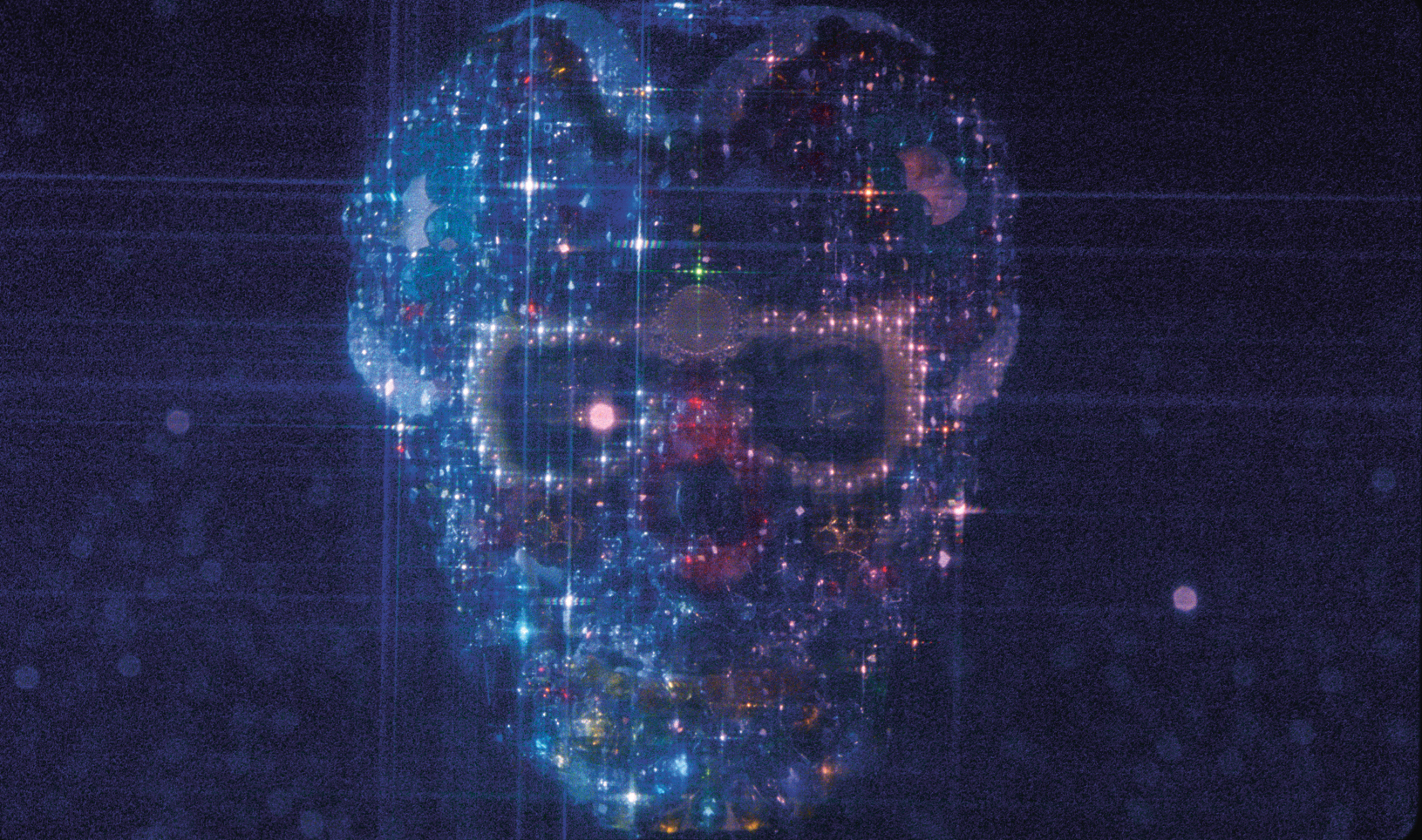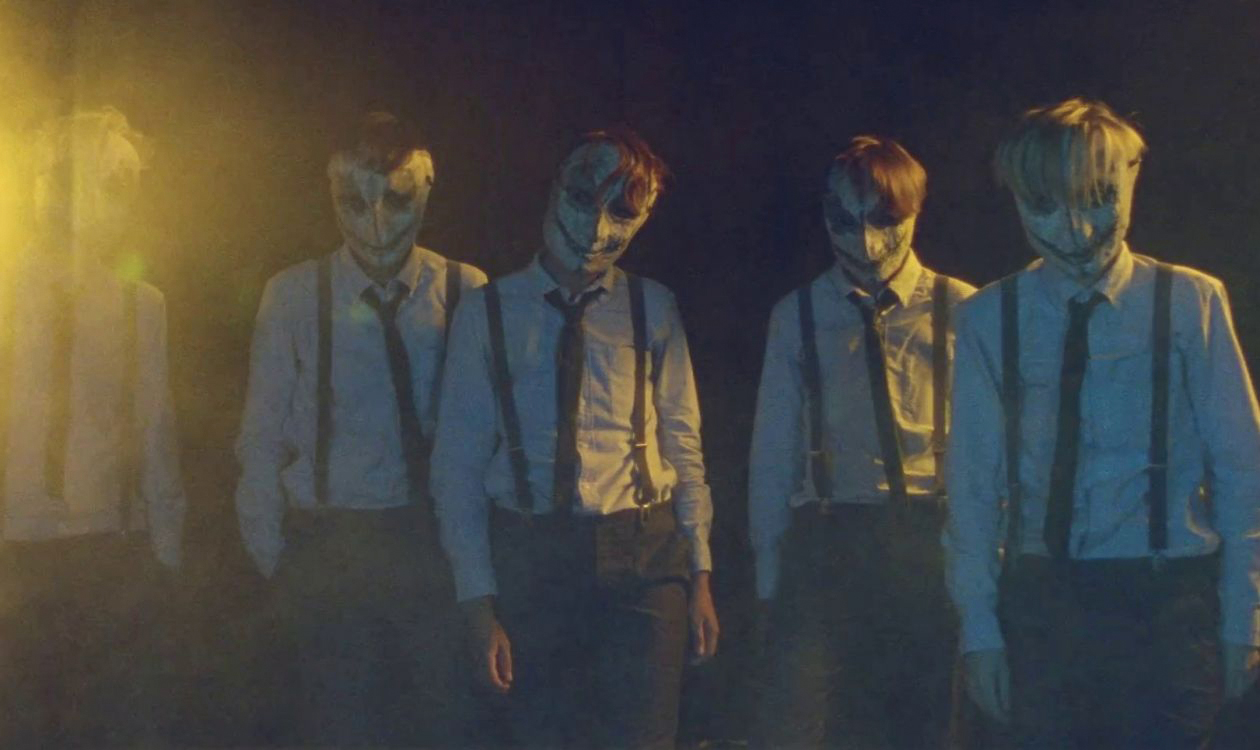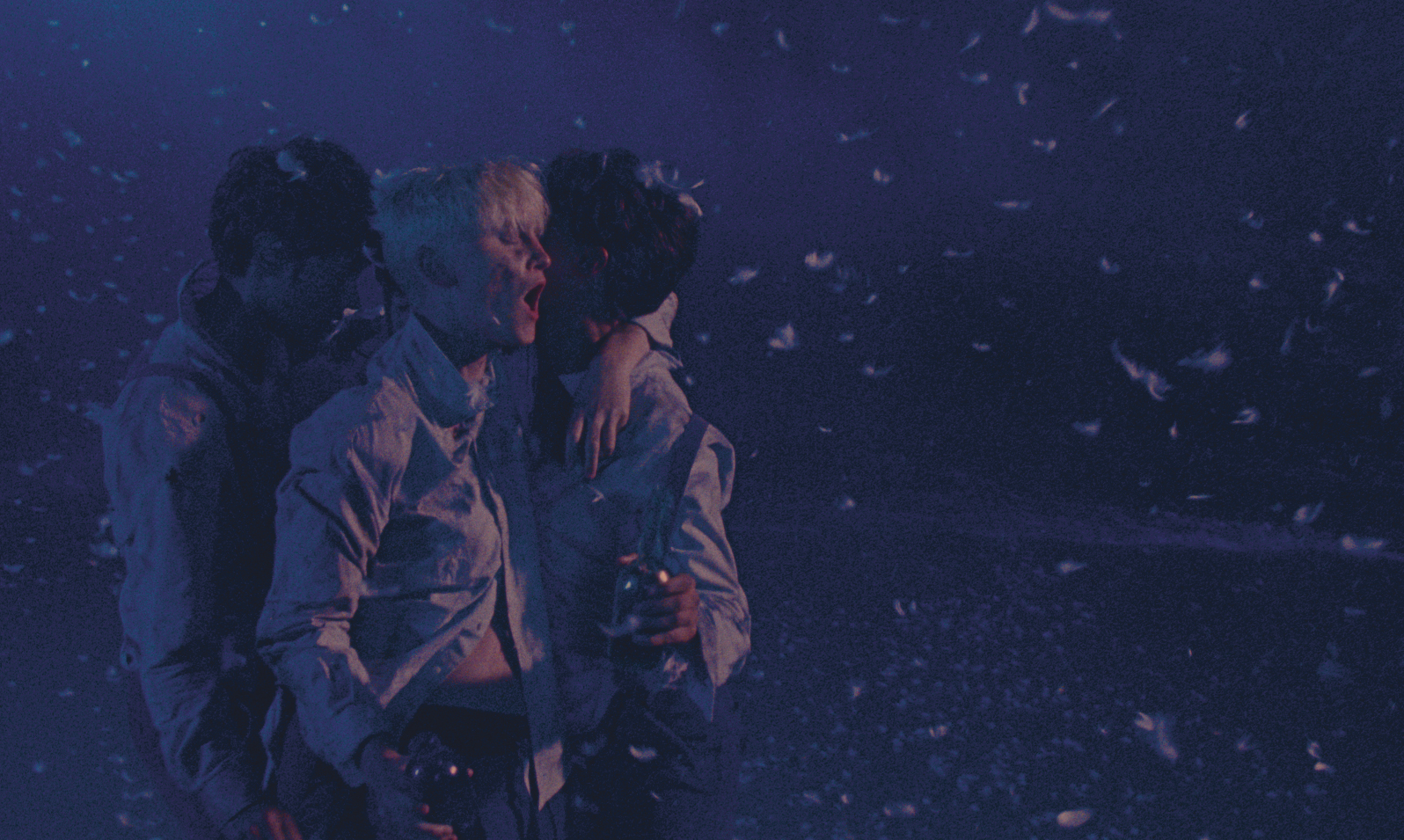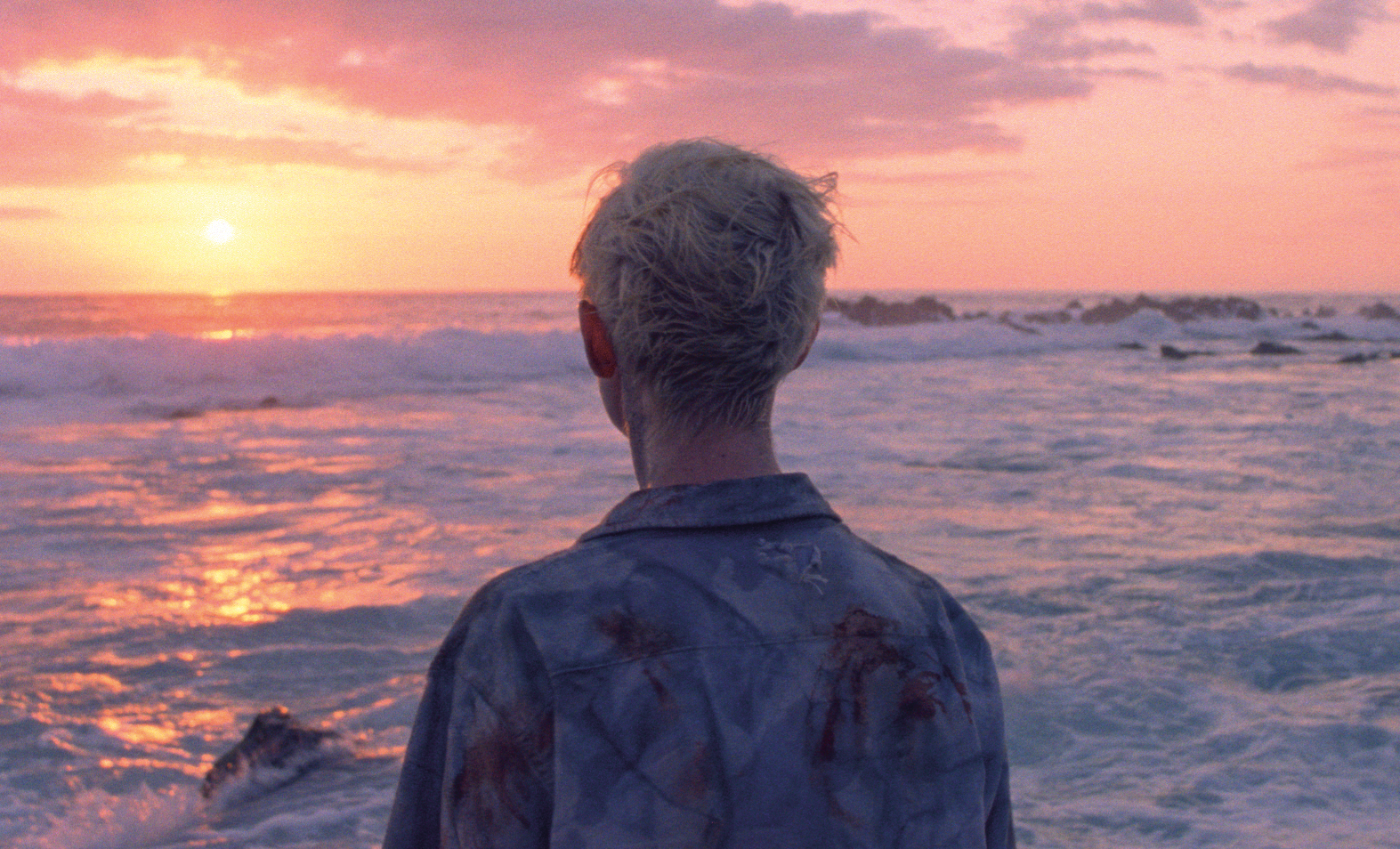The short films of French director Bertrand Mandico have long served as a kind of secret handshake among film lovers who yearn for a cinema of unrestrained, shape-shifting desires and defiantly outlandish aesthetics. But I certainly wasn’t prepared for the sensual exuberance of his long-awaited first feature Les Garçons sauvages (The Wild Boys), a gender-bending, influence-scrambling seafaring adventure tale about five teenage miscreants sent on a boat journey with a mysterious Dutch captain who has promised to bring them back to their parents as obedient boys – or not at all. What the captain hasn’t mentioned is that his innovative therapy includes a visit to an island where thick white liquid spurts from phallic branches, where the earth opens up to envelop humans in its erotic grasp, and where males transform into females. As I watched the boys get lost in the island’s luxuriant plant life, torn between the promise of erotic delight and the threat of death, I happily surrendered to Bertrand’s radically free vision of cinema. A few days later, I was delighted to speak to him about the development of his delirious baroque sensibility, which I find so refreshingly different from the carefully calibrated aesthetic of so many contemporary art films.

Les garçons sauvages (Wild Boys), 2018
Courtesy film still: UFO distribution, ECCE Films
Nicholas Elliott: I’ll start with the obvious question of transformation. Everything in The Wild Boys transforms: boys into girls, humans into animals, etcetera. What attracts you to transformation?
Bertrand Mandico: For me, the notion of metamorphosis is synonymous with life, evolution and progress. I don’t like things that are static and locked into place. Metamorphosis is clearly a driving force in my art and imagination. So, it was natural for me to work on this state of metamorphosis when I started thinking about this story.
Nicholas: In the metamorphosis from one gender to another, the viewer can experience an odd mix of arousal and confusion when faced with androgyny. Your previous films have often dealt with this sense of blurring, but The Wild Boys reaches a level where we completely forget the actual gender of the person we’re looking at.
Bertrand: That’s something I really like: this idea of going beyond blurriness to erase gender and reach an unsettling state. Providing the viewer with a sense of abandon where gender is on a completely blurred, abstract level. What interested me about this project from the beginning, and which was part of the narrative’s initial concept, was to ask actresses to play boys. And also, to offer actresses parts they don’t generally get the opportunity to play. With that in place, I push viewers to lose their bearings. We have this very androgynous situation of actresses evoking boys and I think that after a while the viewer accepts this state of affairs, knowing, or more or less guessing, that these are actresses. Then these male characters turn into girls, revealing the actresses’ original femininity, while at the same time showing how, on a deeper level, these boys remain boys despite having the appearance of women. This creates an unsettling, possibly arousing sensation, a blurring of the perception and intellectualization of what we see.
Nicholas: You use two terms I find really interesting: abandon and loss of bearings. What makes the loss of bearings erotic?
Bertrand: I have a hard time with a binary approach to sexuality, where you have to position yourself on a particular side. This limits the field of action, it divides. Personally, I prefer the idea of a different dynamic, of perpetual metamorphosis or the prospect of metamorphosis, of a more blurred identity. There’s something modern about that, something nearly futuristic. It opens new prospects of both narrative and sexual possibilities.
Nicholas: It’s nice to hear you talk about fluidity in terms of futurism, because it strikes me as a rather different approach to sexuality, where even queer discourse can prove quite dogmatic.
Bertrand: I find myself in a very queer context, in the original sense of the term, by which I mean something that is not hetero-normed. I also associate that with a kind of underground, of avant-gardism, which is based on what is not in the sexual norm, and is more in the field of research or investigation, one could say, or of open-mindedness. In that sense, I think I’m profoundly queer. But yes, perhaps what I do has a more experimental, less conventional dimension than what we generally associate with that kind of discourse.
Nicholas: Maybe that can bring us back to the notion of abandon, which I find so beautiful in your films. Watching The Wild Boys, I feel like I have to abandon myself to the film, both in terms of narrative and sensuality. How do your narrative and aesthetic choices lead us to abandon ourselves?
Bertrand: That’s what I expect from a film. I want it to take me by the hand and carry me away in an inebriating waltz, in which I lose my bearings and let go – I let go of my everyday life, of whatever’s worrying me at the moment, and find myself in a spectacle that takes me elsewhere and makes me forget whatever I’m living. That’s what a film should be. It seems that perhaps we’ve forgotten about this, as currently cinema tends towards a kind of realism rooted in social concerns. It’s good that this exists; however, it’s also nice to have an alternative. Too often flights of imagination are left to big American mainstream productions, which provide one reading of what fantasy and the imagination should be. I believe we can reclaim the imagination and make other offerings in that category.
…my films eroticize pretty much everything they touch…
Nicholas: That’s exactly what makes The Wild Boys so pleasantly unsettling for me. The fantasy and imagination at play in Hollywood films generally seem restrictive and unsurprising. Whereas with your film, I not only don’t know what to think; I don’t know what to feel. How do you create such an immersive, dizzying experience?
Bertrand: It starts with the writing of the narrative. I’m in a novelistic dimension; I try to evacuate all the habits of current screenwriting. Screenwriters have a tendency to write extremely effective, carefully calibrated stories. I went back to the sources, back to adventure novels. What I like about novels is that there are digressions, sudden shifts, changes in rhythm, new directions: in short, the unexpected. My film is a hybrid, in a way. It draws from adventure novels for kids, or at least for all audiences, but it also goes into more underground, more unsettling, and more sexual stories, like Burroughs’ books. The film grafts very adult, very dark stories to stories drawn from the imaginary world of childhood. Perhaps it’s the mash-up of the two that creates a kind of dizziness. Later, I conceive my sound design as an organic whole, which may also create an impression of giddiness or a whirlpool.
I really want the viewer to be swept away as if he were in a canyon: the film becomes a river, with accelerations, rapids, occasional calmer pools of water, and, finally, a waterfall brings us somewhere else. Those are the dynamics I use to build my narrative. Then I think there’s also a rather singular element, which is a very strong relationship to eroticization. I’m not making erotic films, but my films eroticize pretty much everything they touch, from nature and the setting to the characters; there’s a constant erotic tension.

Les garçons sauvages (Wild Boys), 2018
Courtesy film still: UFO distribution, ECCE Films
Nicholas: It’s a strange tension. As a viewer, I receive contradictory signals. For instance, there’s the scene on the island when the boys suck the phallic outgrowths of a tree, while a very gentle, warm song by Cluster plays on the soundtrack. I really don’t know what to do with my critical faculties at that point: on the one hand, it’s grotesque, even comical, but on the other, it attracts and excites me, even soothes me. How do you situate yourself in relation to comedy and camp?
Bertrand: In that scene in particular, which has both a very sexual and a grotesque aspect, I like the idea of a shot containing contradictory elements, allowing me to attenuate certain effects and provide a second reading, beneath the surface. The contradictions create that unsettling feeling of arousal. In this scene, the boys are sucking outgrowths on a tree. The outgrowths are very phallic, there’s milk running, and so there’s a strong sexual, even grotesque, dimension. Which, in turn, is completely contradicted by Cluster’s childhood-invoking music. One could view the scene as young teens rediscovering the maternal breast and seeking comfort by sucking on it. The double reading creates a collision between the viewer’s sexual impulse and the impression of childhood I’ve brought to mind. These are characters that are between stages in life: they have the sexual impulses of adults, but, ultimately, they’re still children. That’s what the shot expresses once I add Cluster’s music.
Nicholas: This touches on an aspect of your films I really like, which is the tension between attraction and repulsion. Often, I’m scared or disgusted by something in your films but also attracted to it. For instance, there’s the creature in your short Notre-Dame des Hormones, which, objectively speaking, is rather repulsive, but it has such power that I want to step onto the screen and grab it.
Bertrand: I’m really interested in that dynamic. I do my best to make the viewer love monsters. It’s too obvious for the monster to be a repulsive, freaky monstrosity in film. It’s a much more interesting challenge to show a monster and to try to turn it into an object of desire, which also helps avoid clichés. It’s as if we’ve entered a new era in cinema: we’ve seen ten million representations of repulsive monsters and now what interests me is for monsters to be loved, accepted, integrated into society, and eroticized. That’s one layer. Then, when I talk about the object of desire – That obscure object of desire, which is the title of a Buñuel film, a title that fascinates me – it’s as if I wanted to put a face on that obscure object of desire.
And so, I start from the idea that if I make it unattractive at first glance, it’s much more interesting for me to try and make it lovable as the film unfolds.
Nicholas: You’re making me think of a very erotic image from The Wild Boys, seen in the dream the five boys have before they set off on their journey. Namely, a naked woman with a man’s head, on a swing.
Bertrand: What’s interesting, though you can barely see it, is that the face is the captain’s. We made a cast of Sam Louwyck’s face and used it as the basis for that mask. It has more hair than the captain, but those are his features. Suddenly this fantastical, nearly diabolical, figure appears. The idea was to create both a somewhat mythological figure, which we see when the captain’s face appears on the dog’s body, an image straight from mythology, as well as an ultra-erotic figure, featuring this young, impressively shaped woman wearing the captain mask, with fruits between her legs. It’s another symbolic figure, but one that’s far more eroticized.
Nicholas: Once you’ve imagined your monsters, how do you go about making them?
Bertrand: For the erotic dimension to be present and for things to truly be embodied, everything has to happen on set, during the shoot. The grain of celluloid, which is a slightly fragile medium, shows the image has not been tampered with: what you see is what was filmed. It’s very important to resolve all these effects during the shoot, because that’s what’s going to create the erotic dimension – there’s really an eroticization of the prop, the accessory. Since it’s quite difficult to describe the creatures in words, I make sketches and collages to communicate my ideas.
Nicholas: In general, your images are very sensual: you shoot on celluloid and you ensure the surface of the frame is full of life, with flashes of light and sand and feathers thrown onto the actors during sex scenes. You also occasionally shift from black-and-white to colour. Could you tell me about the sensuality of the image in your film and, more specifically, what guides your decisions in shifting from colour to black-and-white?
Bertrand: I work with celluloid because it’s by definition a sensitive medium. There’s something extremely sensual about this way of capturing bodies.
I find that digital is closer to the scanner, while celluloid is much closer to a caress. Recording on celluloid is extremely erotic. Regarding The Wild Boys, I always conceived of it in black-and-white since the green of the jungle is quite polluting, and I wanted this to be a story of light and shadow. I wanted to be able to move easily from the soundstage to outdoor locations without having the viewer notice different filming sources. But I also really wanted to use colour, and I found that the colour was much stronger when it was surrounded by black and white. I was inspired by the films of Koji Wakamatsu. Wakamatsu made erotic and political films, with limited means, and would use colour in an over-the-top, seductive way at points when it could make a strong impression on the viewer’s imagination, i.e. in sex scenes and scenes of violence. I find this eruption of colour extremely powerful, violent, disturbing and beautiful. I wanted to keep this idea of erupting colour, but I wanted it to be unexpected. I didn’t want to allocate colour to dreams, fantasies, or the past. So, I searched for the narrative’s energy when I was writing and at certain points I could feel there was like the rising of the sap, the colour had to erupt.

Les garçons sauvages (Wild Boys), 2018
Courtesy film still: UFO distribution, ECCE Films
Nicholas: One theme we haven’t touched on yet is punishment. Is it a punishment to transform from a boy to a girl? Or to stay stuck between two genders, like the captain and Tanguy?
Bertrand: Personally, I detest any notion of punishment and authority. That’s something I can’t tolerate in life. In the film, the punishment, or rather the therapy offered by the captain and Séverine, who is the character really running the show, is a kind of feminization of the boys, which takes place through what could be called a castration. When the captain comes to see the boys’ parents, he comes with a boy who is displayed in living rooms to show how well the therapy works. I show this slightly round boy, singing with a castrato’s voice, and while he sings in his frail voice, the voice-over recounts his misdeeds. Seeing how docile he is now proves that the therapy works. It’s a rather coarse therapy, but what I was interested in was showing the boys’ ability to adapt to their new state.
Nicholas: Séverine is played by Elina Löwensohn, with whom you’ve worked several times.
Bertrand: I initially discovered Elina in Hal Hartley films like Simple Men and Amateur, and of course I saw her in Michael Almereyda’s Nadja and Philippe Grandrieux’s Sombre. She is a fascinating, extremely cinegenic actress, who is able to utterly transform herself. I had a revelation about her when I made Boro in a Box, my short about the Polish director Walerian Borowczyk. She plays a double role, and the revelation came not when Elina was Borowczyk’s mother, but when she’s Borowczyk himself, with a box on her head. Paradoxically, I found that I was even fascinated with her when I could no longer see her face and she was playing at having a boy’s body. I invited her to work with me on a series of twenty-one short films, 20+1 Projections. This series deals with the aging of the actress and of my own gaze, and is also a reflection on the evolution of the body. Elina is ready to work with metamorphosis: we search for her character together and she can take my suggestions really far, into places where other actresses would not go. I can make her ugly and it really amuses her. She has this changing, chameleon side that makes me think of Cindy Sherman’s portraits, in that she can become so many different characters.
Nicholas: She’s also an actress who’s willing to stray far from naturalism.
Bertrand: Absolutely. We both love stylization. I think that ultimately naturalism, so-called realism, in cinema is completely fake. Trying to make us believe that a famous actor is a factory worker is anything but realistic. On the other hand, making films that accept and present themselves as such, films that show their artifice and their own production, that’s realism.
Nicholas: I’d like to talk about some of the influences on the film: I’m assuming William S. Burroughs’ novel The Wild Boys was significant?
Bertrand: There are images in Burroughs’ novel that really struck me, notably images of young boys copulating with plants, which are extremely graphic and violent, but also really beautiful. These images may have been the seeds for the film. The novel also features the idea of an army of wild boys who seek to rule the world. And in fact there was this movement in 1920s Germany known as the Wild Boys. I assume it’s what inspired Burroughs. These were groups of young men who took to the roads and had extremely mysterious, pagan initiation rites. They had an eroticized relationship to the body and sometimes cross-dressed. I saw a photo story that a French journalist did about them at the time and was really inspired by it, though I didn’t imitate their style of dressing in the film.
Nicholas: As a seafaring adventure, your film naturally brings to mind the great Raúl Ruiz. I had even prepared a somewhat facile phrase, which was that The Wild Boys was like the erotic, sexualized version of a Raúl Ruiz movie, given that sexuality isn’t particularly prominent in his work. Last night, I saw his wonderful gender-bending Dog’s Dialogue and realized I was wrong. In what sense has Raúl Ruiz been an influence on The Wild Boys?
Bertrand: I like Ruiz a great deal. It’s funny that you should mention Dog’s Dialogue because it’s one of the first of his films that I saw, and I absolutely love it. What interested me about Ruiz is his ability to take on a cinematic genre that is normally expensive and complex to stage, whereas he succeeds in launching into a big adventure tale with very little money, by creating effects on set, and with a very strong phantasmagorical dimension. It’s true that there isn’t much eroticization in Ruiz, though you sometimes find it: he filmed Robert Mapplethorpe’s muse Lisa Lyon doing a striptease in Three Crowns of the Sailor. In fact, she removes her nipples and her pubic hair, leaving nothing, and completely disconcerting the captain who is watching her.
I adore that sequence. To my taste, there’s not enough eroticism in Ruiz, but when it’s there, it’s unsettling. He’s certainly an inspiration; he shows the way. His stories are less linear and more complex than mine. I aim for a more mainstream narrative, and by mainstream, I mean the viewer surrenders to the film and is carried away from point A to point B.
The people I feel a kinship with have a naïvely romantic desire for pleasure – jouissance – and for cinema.
Nicholas: The reason a film lover such as myself jumps on the Ruiz reference when discovering your film is that he doesn’t have enough descendants nowadays. There’s a lack of that kind of narrative, aesthetic risk-taking in contemporary film, which is why it’s such a pleasure to see The Wild Boys. Your films and those of directors like Yann Gonzalez give me hope that there could be a return to a crazier, more hedonistic, freer conception of cinema.
Bertrand: Yann Gonzalez is my brother in cinema. And a close friend. We share a lot, both in our cinematic desires and our taste for celluloid. Naturally, like every filmmaker, I feel a little lonely sometimes, but luckily I feel close to people like Yann, or Caroline Poggi and Jonathan Vinel, a couple of French directors who have made quite a few shorts and are about to make their first feature. I also see other singular filmmakers out there, whose films may not look much like mine, but they are developing their own creative worlds and have a real faith in cinema. I think this is a generational dynamic related to a rejection of arthouse films formatted for international film festivals, films that are generally quite cold and cynical. The people I feel a kinship with have a naïvely romantic desire for pleasure – jouissance – and for cinema.

Les garçons sauvages (Wild Boys), 2018
Courtesy film still: UFO distribution, ECCE Films
Nicholas: Do you think this dynamic goes against the spirit of the times?
Bertrand: The spirit of the times is like a wind that’s constantly changing directions. I think there’s a movement that has appeared in reaction to a certain kind of dominant auteur cinema: inevitably, when you’re dominated, you revolt.
Nicholas: I’m asking you this because I recognize the kind of film you’re talking about: a moralistic type of film, even when it pretends not to be, and which rejects pleasure and bullies the viewer. What’s exciting and also risky about your film is that morality is very distant from your concerns. I want to watch the wild boys; I might even want to touch them, despite the fact that they are introduced to us as rapists and, all in all, bastards.
Bertrand: I like the idea that cinema is amoral – not immoral, but amoral. I want to tell stories about free characters, freely. Telling stories doesn’t mean that I’m drawing conclusions on society. No. I’m sweeping the viewer up into adventures that will push him/her to think and to open his/her mind.